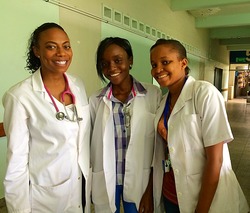Four Weeks at Weill Bugando Medical Centre
Kyle Monk is a pediatric resident who spent four weeks at Weill Bugando Medical Centre in Mwanza, Tanzania.
To be a great physician, I think it’s important to have exposure to different diseases, and also to know how to practice in challenging situations. When seeking residency programs, I was drawn to Cornell because of their global health program and the opportunity to practice in a resource limited environment. I thought this would be a great way to see the world, and also make me a more well-rounded physician.
Before leaving for Tanzania, I started preparing lectures and brushing up on my knowledge so that I could teach the medical students and residents. It was stressed to me that I would have a close relationship with the medical students, and have a large responsibility with bedside and formal teaching. What I wasn’t prepared for, was how much I was going to learn from them.
Each morning began with morning report, where the overnight intern, resident and medical student would present the new admissions from the day prior. After the presentation, all of the other medical students, residents, and attendings would ask questions, and offer input in order to best understand the disease process and to make sure that all members of the team were considering all possible diagnoses. This really demonstrated their commitment to learning and teaching.

Informally, I learned so many other skills and about improvising. I realized I was traveling to a resource limited environment, but I was not prepared for how limited the resources were. It made me reflect upon our common practices, how we perform many blood draws and have easily accessible radiology to confirm our suspicions. Instead, in Tanzania, I relied upon my history, physical exam, and understanding of pathology.
I was impressed with the amount of team work and sense of community the physicians and patients demonstrated. A big difference in the health care models I’ve experienced in the US and in Tanzania is that, prior to treatment, the parents of the patients must purchase medications and fluids before the nurses can administer them. Unfortunately due to financial constraints, many of the patients were not able to secure the recommended medicines, or were not able to get x-rays or appropriate studies. Other patients would share medications or donate whatever resources they had. This challenged me to determine the most effective treatment plan for each patient, and to search for the best diagnosis so that extra costly and unnecessary studies weren’t ordered. I also learned more compassion, and the importance of relationships between people.
I don’t think that anyone could properly prepare me for the feeling of hopelessness that came over me. Regardless of the amount of times I’ve seen a disease, or read about how to treat a certain illness, there were many times we couldn’t offer treatment to patients. Some patients would come with very common, simple complaints, however without access to certain resources, we were not able to help them. It is always heart breaking not being able to help a child in need. That feeling stays with me, and many others, and drives us to want to find better ways to help disadvantaged communities find sustainable resources so that this doesn’t continue.
Every person I met in Tanzania was extremely welcoming and appreciative of the time and efforts we were offering. I will forever remember this experience, and know that I am a better physician because of my time at Weill Bugando Medical Center.
Kyle Monk, MD
PGY3 Pediatric Resident
Weill Cornell Medicine Center for Global Health
Center for Global Health
420 East 70th Street, 4th Floor, Suite LH-455
New York, NY 10021
Phone: (646) 962-8140
Fax: (646) 962-0285

